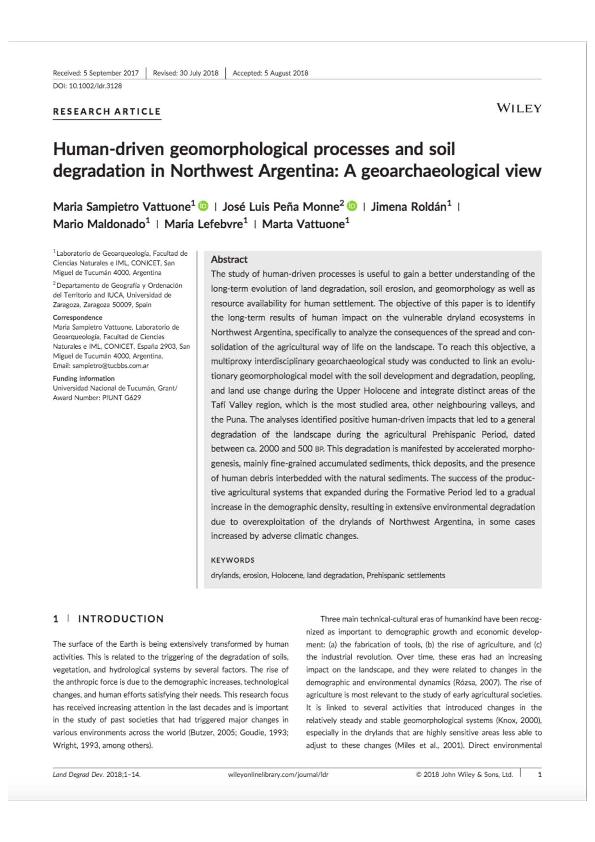Artículo
Human-driven geomorphological processes and soil degradation in Northwest Argentina: A geoarchaeological view
Sampietro Vattuone, Maria Marta ; Peña Monne, José Luis; Roldán, Jimena
; Peña Monne, José Luis; Roldán, Jimena ; Maldonado, Mario Gabriel
; Maldonado, Mario Gabriel ; Lefebvre, Maria Gisela
; Lefebvre, Maria Gisela ; Sampietro Vattuone, Maria Marta
; Sampietro Vattuone, Maria Marta
 ; Peña Monne, José Luis; Roldán, Jimena
; Peña Monne, José Luis; Roldán, Jimena ; Maldonado, Mario Gabriel
; Maldonado, Mario Gabriel ; Lefebvre, Maria Gisela
; Lefebvre, Maria Gisela ; Sampietro Vattuone, Maria Marta
; Sampietro Vattuone, Maria Marta
Fecha de publicación:
11/2018
Editorial:
John Wiley & Sons Ltd
Revista:
Land Degradation & Development
ISSN:
1085-3278
Idioma:
Inglés
Tipo de recurso:
Artículo publicado
Clasificación temática:
Resumen
The study of human-driven processes is useful to gain a better understanding of the long-term evolution of land degradation, soil erosion, and geomorphology as well as resource availability for human settlement. The objective of this paper is to identify the long-term results of human impact on the vulnerable dryland ecosystems in Northwest Argentina, specifically to analyze the consequences of the spread and consolidation of the agricultural way of life on the landscape. To reach this objective, a multiproxy interdisciplinary geoarchaeological study was conducted to link an evolutionary geomorphological model with the soil development and degradation, peopling, and land use change during the Upper Holocene and integrate distinct areas of the Tafí Valley region, which is the most studied area, other neighbouring valleys, and the Puna. The analyses identified positive human-driven impacts that led to a general degradation of the landscape during the agricultural Prehispanic Period, dated between ca. 2000 and 500 bp. This degradation is manifested by accelerated morphogenesis, mainly fine-grained accumulated sediments, thick deposits, and the presence of human debris interbedded with the natural sediments. The success of the productive agricultural systems that expanded during the Formative Period led to a gradual increase in the demographic density, resulting in extensive environmental degradation due to overexploitation of the drylands of Northwest Argentina, in some cases increased by adverse climatic changes.
Palabras clave:
DRYLANDS
,
EROSION
,
HOLOCENE
,
LAND DEGRADATION
,
PREHISPANIC SETTLEMENTS
Archivos asociados
Licencia
Identificadores
Colecciones
Articulos(CCT - NOA SUR)
Articulos de CTRO.CIENTIFICO TECNOL.CONICET - NOA SUR
Articulos de CTRO.CIENTIFICO TECNOL.CONICET - NOA SUR
Citación
Sampietro Vattuone, Maria Marta; Peña Monne, José Luis; Roldán, Jimena; Maldonado, Mario Gabriel; Lefebvre, Maria Gisela; et al.; Human-driven geomorphological processes and soil degradation in Northwest Argentina: A geoarchaeological view; John Wiley & Sons Ltd; Land Degradation & Development; 29; 11; 11-2018; 3852-3865
Compartir
Altmétricas



